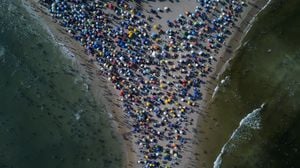The recent cancellation of Francesca Albanese's visit to the Dutch Parliament has stirred significant political controversy, highlighting the complex intersection of free speech and international diplomacy. The UN rapporteur for the Palestinian territories was scheduled to address the Dutch Parliament this week, but swift backlash from right-leaning political groups led to the last-minute withdrawal of her invitation.
On Tuesday, the Foreign Affairs Committee of the Tweede Kamer, the Dutch Parliament, made the decision to revoke Albanese's invitation, citing her outspoken criticism of Israel as the core reason. The proposal to cancel her appearance came from the SGP (Reformed Political Party), with its member Diederik van Dijk articulately opposing the visit, referring to Albanese as 'the very biased UN rapporteur'. He contended, "It is unthinkable for such a person to be actively invited to the Tweede Kamer." The SGP and its allies, including parties like the PVV (Party for Freedom) and FVD (Forum for Democracy), expressed deep concern over Albanese's previous comments and their potential impact on the parliament's credibility.
Albanese has faced significant backlash for her remarks, which critics argue cross the line from legitimate criticism of Israeli policy to antisemitism. Notably, she has made controversial analogies, likening Israeli actions during the Gaza conflict to those of Nazi Germany. Such comparisons have drawn condemnation not only from the political right within the Netherlands but also from international bodies. According to reports, Germany, France, Canada, and the United States have denounced her statements as antisemitic.
Adding to the turmoil, Minister of Foreign Affairs Caspar Veldkamp announced on Monday he would refuse to meet with Albanese during her visit, stating his stance solidified the growing dissent among parliamentarians. Kati Piri of GroenLinks-PVD (Green Left-Party of Labor), who initially invited Albanese, expressed her dismay at the situation, describing the aborting of the meeting as a 'disgraceful moment' for the parliament. She argued this reflects broader tendencies within politics to silence those advocating for Palestinian rights, claiming it exemplifies the tactics of 'cancel culture' employed by right-wing factions.
The discussion of Albanese's visit also highlighted the division among Dutch political parties. While parties like D66 and GroenLinks initially supported her appearance, the SGP's organized resistance swayed many undecided members. Politicians like VVD (People's Party for Freedom and Democracy) and JA21 (a right-wing party) shifted their stance from support to opposition, citing mounting pressure from constituents and party lines against Albanese's perceived anti-Israel sentiment.
Albanese was not entirely cast aside, as plans were enacted for her to engage with smaller groups and individuals seeking to discuss her research and findings outside official parliamentary proceedings. She remarked before the cancellation, "From what I understand, VVD felt strong pressure from the usual pro-Israel lobby, which seems very strong here as well." She emphasized her determination to continue engaging with Dutch citizens and representatives during her time in the country, though it would not occur under the auspices of the official government platforms initially intended.
The cancellation has sparked broader discussions about the limits of permissible political discourse around the sensitive Israeli-Palestinian conflict. Critics of the decision argue it undermines democratic principles of open debate and the right to hear potentially opposing viewpoints, even if uncomfortable. The notion of the right to criticize state actions without being labeled antisemitic is at the forefront of this debate.
Supporters of Albanese point out her statements must be understood within the wider scope of her advocacy for human rights rather than viewed through the lens of national allegiance. They argue silencing voices on this issue hinders the pursuit of justice for Palestinians and perpetuates cycles of conflict.
Albanese, who has held the position of UN rapporteur since April 2022, has gained notoriety for probing allegations of human rights abuses and war crimes against the Palestinian population. Her past statements have included references to the Gaza Strip as one of the largest 'concentration camps' of the 21st century, inciting fierce criticism from various international figures and governments. Still, she maintains her arguments target the human rights violations rather than the legitimacy or existence of the Israeli state itself.
Those against her often frame her rhetoric as harmful and inflammatory, labeling her as 'an Israel and Jew hater'. Yet they dismiss her clarifications distinguishing between the state of Israel and its individuals, as she insists her opposition is to state policy, not the population itself.
A video of the meeting where the parliamentarians voted to cancel her visit reflected the high tensions and stakes at play concerning freedom of speech and ethnic sensitivities. Observers noted the sharp divide among lawmakers, with strong reactions expressed on the floor. Many were quick to criticize the decision but were unable to rally enough support to override the majority's stance.
At the heart of this political spectacle lies the question of whether apparent antisemitism stands as legitimate grounds for terminating academic, governmental, or discursive opportunities for engagement. The cancellation of Francesca Albanese's visit to the Dutch Parliament encapsulates the broader tensions many democracies face today as they navigate the treacherous waters of international discourse, historical memory, and the politics of representation.



